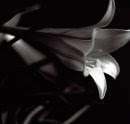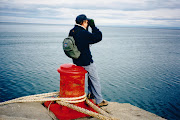In Boone, North Carolina, a three-mile track of narrow asphalt and iron bridges creek-hops and rolls past meadows, sports fields, the ruin of an old dam and the pale blue tanks of a sewage plant. Start at the Armory, and you'll come first to the Equestrian Field. It was empty as a Roman arena yesterday when I and my husband and our two dogs strolled by, its grass perfect, untouched, an oval platter. The fence was freshly stained and smelled like biology class. Joggers went around it, not through it, and passed us going in both directions. A woman too heavy for her feet rested on a bench, then got up and tried again. Another runner passed, and for a moment the air smelled of eucalyptus. We aren't trees, but apparently we don't, from time to time, mind smelling like them.
At the first bridge we met a mother and her small daughter walking a tiny dog. I asked what breed it was. It looked like a pug had crawled inside the glove-box of a terrier.
"Oh," said the mother, "she's a Humane Society dog. Great dog. I think she'll find a good home."
"So you're fostering her?"
"No." The mother stroked her daughters' curly hair, and the daughter, holding the leash, imitated her, bending down and stroking the dog's fur. "We just like to stop by the Humane Society and take a doggie out for a walk. They really appreciate it when you do that. And it's so convenient, right here on the Greenway. Except that now they're moving at the end of the month."
"That's a pity."
"Well no, not really. We won't miss the sewage plant."
We waved and walked on, taking a path that led away from the main one and into the trees. There we met a woman walking an old, gray-muzzled cattle dog off-leash. She made a move to tether him, considerately, but we told her we didn't mind. I asked where the trail came out, and she showed me where it joined the Greenway again. The arm she pointed with was bright as a chalked sidewalk, tattooed with blue and yellow daises. Her hair was wild, and it looked as though she'd been lying on her side, dreaming.
At the power station was an old marker explaining how electricity came to Boone in 1915, lighting up a school and six residences. I wondered what it must have been like to get that first surge. The dam was nothing but old oak beams on the floor of the creek now, and the station a stone ruin that looked like a bombed church. At the creek's edge we met two college students. One was studying criminal justice, the other wanted to be a veterinarian. Her, dog, a Blue Heeler-Aussie mix, was named Beau, and playfully fought our dogs to hold on to his own toy.
Around the next bend we started to smell sewage. The breeze flushed the stink up our noses, that smell you're ashamed to recognize as so familiar, as your own, magnified and gone stale. What a nuisance, we said. And right along the Greenway, too.
"Although maybe we shouldn't fuss," my husband said, staring through the chainlink fence toward the cesspools. "We're looking at what's probably the single greatest human achievement, ever. It's what the whole of modern civilization rests on."
Right next door to the plant were the low, dilapidated roofs of the Humane Society. It was easy to see why a move was underway. The buildings and kennels were small. The human stench too close. Two young women came out leading a hulking white dog. We stopped to say hello. His name was Scout; he was a year-and-a-half old, and they had just adopted him. It was sad, they said, how many dogs needed a home. Then Scout pulled them off into the grass. He had to use the bathroom.
The Greenway ends here. Time to turn around and run the gauntlet of need and shame and power back to the arena and the Armory, with our dogs pulling ahead, sticking their noses in everywhere, judging how recent a mark was, and whether its architecture needed redoing.
Friday, August 12, 2011
Subscribe to:
Posts (Atom)













